
Floer Homology, Gauge Theory, and Low Dimensional Topology
by David Ellwood, at al.
Publisher: American Mathematical Society 2006
ISBN/ASIN: 0821838458
ISBN-13: 9780821838457
Number of pages: 314
Description:
Mathematical gauge theory studies connections on principal bundles, or, more precisely, the solution spaces of certain partial differential equations for such connections. Historically, these equations have come from mathematical physics, and play an important role in the description of the electro-weak and strong nuclear forces.
Download or read it online for free here:
Download link
(3.1MB, PDF)
Similar books
 Optimization Algorithms on Matrix Manifolds
Optimization Algorithms on Matrix Manifoldsby P.-A. Absil, R. Mahony, R. Sepulchre - Princeton University Press
Many science and engineering problems can be rephrased as optimization problems on matrix search spaces endowed with a manifold structure. This book shows how to exploit the structure of such problems to develop efficient numerical algorithms.
(17921 views)
 Manifolds
Manifoldsby Neil Lambert - King's College London
From the table of contents: Manifolds (Elementary Topology and Definitions); The Tangent Space; Maps Between Manifolds; Vector Fields; Tensors; Differential Forms; Connections, Curvature and Metrics; Riemannian Manifolds.
(9936 views)
 Topology
Topologyby Curtis T. McMullen - Harvard University
Contents: Introduction; Background in set theory; Topology; Connected spaces; Compact spaces; Metric spaces; Normal spaces; Algebraic topology and homotopy theory; Categories and paths; Path lifting and covering spaces; Global topology; etc.
(7884 views)
 The Convenient Setting of Global Analysis
The Convenient Setting of Global Analysisby Andreas Kriegl, Peter W. Michor - American Mathematical Society
This book lays the foundations of differential calculus in infinite dimensions and discusses those applications in infinite dimensional differential geometry and global analysis not involving Sobolev completions and fixed point theory.
(13543 views)